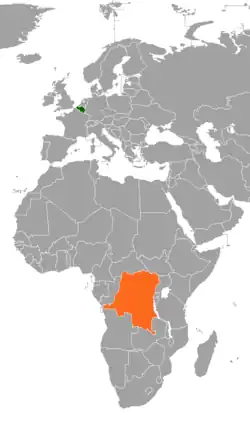Belgium–Democratic Republic of the Congo relations
Belgium–Congo relations refers to relations between the Kingdom of Belgium and the Democratic Republic of the Congo. The relationship started with the exploration of the Congo river by Henry Morton Stanley.
 | |
Belgium |
DR Congo |
|---|---|
Belgium has an embassy in Kinshasa and a consulate-general in Lubumbashi. The DR Congo has an embassy in Brussels and a consulate-general in Antwerp. Both nations are members of the Organisation internationale de la Francophonie and the United Nations.
History
Following Stanley's expedition to the Congo, King Leopold II initially ruled Congo as his personal property following the Berlin Conference.[1][2] On 18 October 1908, the Belgian parliament voted to annex the Congo Free State;[3] on 15 November 1908, Leopold formally relinquished personal control over the state to Belgium, forming the Belgian Congo. During the Free State period, Congo was reputed to have been brutalised by a harsh economic policy that entailed rubber production quotas to be met by forced labour.[2] Other crops were also farmed in the Congo.[4]
Political ties
Shortly after the Congo's independence in 1960, relations between Belgium and the Congo deteriorated and the Congolese government severed relations and ordered the expulsion of Ambassador Jean van den Bosch. France assumed responsibility for representing Belgian interests in the Congo.[5]
After fifty years of Congo's independence, a visit by the Belgian King Albert II was met with controversy as the king's brother, Baudouin, was said to have been connected to the assassination of Patrice Lumumba, and Lumumba's family sought to bring a case against 12 Belgians claiming Lumumba's torture and murder constituted war crimes.[6]
Amidst other controversies, Congo's Minister of Communication, Lambert Mende Omalanga, described an "unacceptable attitude of the Belgian political class to consider the Congolese problems as internal affairs of their country," following such allegations as the "very bizarre case of a purely imaginary invitation of Belgian soldiers to participate in the military parade in Kinshasa," amongst others. He then said "coloniser to colonised relations is over." The Belgian Minister for Development Cooperation, Charles Michel, then expressed surprise at the remarks and demanded respect for Belgium.[7]
During a visit by a Belgian cabinet delegation in 2008 to the Congo, President Joseph Kabila said he did not appreciate a message brought by the team in regards to human rights issues. Kabila said: "Belgium must make a choice on the type of relationship it wants to have with the Democratic Republic of Congo. It has a choice between having good relations as partners in a mature relationship with a sovereign and independent state or a master-slave relationship. I will note that every time a Belgian delegation is led by the minister of foreign affairs; it is with a lot of arrogance, as if our visitors are coming here to lecture us. This is unacceptable. The Congo will never accept this, definitely not me."[8]
In December 2016, when President Kabila announced the postponement of elections and that he would not be stepping down despite the end of his constitutional mandate, the Belgian government announced that it would "re-examine" its relations with the DRC.[9] The Belgian government also advised its citizens to not visit the DRC due to the political unrest.[10] In April 2017, it was announced that the Congolese government informed the Belgian military attaché in Kinshasa that DR Congo would suspend military cooperation with Belgium, after foreign minister Didier Reynders criticized President Kabila's choice of the new Prime Minister, Bruno Tshibala.[11]
On 30 June 2020, King Philippe of Belgium expressed his "deep regrets", but not apologies, for the atrocities in the Congo Free State in a letter to the Congolese president.[12] In June 2022, King Philippe of Belgium, returned a mask, called Kakungu, which was used during healing ceremonies by the Suku people, and previously exhibited at the Royal Museum for Central Africa, during a week-long visit to DR Congo at the invitation of President Félix Tshisekedi. In addition, in a speech on the grounds of the Congolese parliament in Kinshasa, he formally condemned the atrocities that occurred when DR Congo was a Belgian colony, saying the colonial government "was one of unequal relations, unjustifiable in itself, marked by paternalism, discrimination and racism".[13]
References
- Hochschild.
- Stengers, Jean, "Le rôle de la commission d'enquête de 1904-1905 au Congo", In Congo: Mythes et réalités, Bruxelles: Editions Racine, 2005, pp. 159-179.
- Senelle, R. and E. Clément (2009), Léopold II et la Charte Coloniale, Brussels: Editions Mols.
- Boahen, A. Adu (1990). Africa Under Colonial Domination, 1880–1935. p. 171.
- "Ruanda-Urundi Affected". The New York Times. Reuters. 10 August 1960. p. 4.
- "Charges sought in Lumumba death 50 years after DRC independence | Radio Netherlands Worldwide". Archived from the original on 2013-10-05. Retrieved 2010-11-30.
- Congo/Belgium: The coloniser to colonised relationship is over
- Tense relations between the DRC and Belgium | Congo Planet
- Williams, Richard (20 December 2016). Belgium says it will 're-examine' relations with Democratic Republic of Congo after Kabila fails to step down. The Independent. Retrieved 14 September 2017.
- Belgium urges citizens out of Congo on fears of violence. Reuters. Published 16 December 2016. Retrieved 15 September 2017.
- DRC suspends military cooperation with Belgium. News24. Published 15 April 2017. Retrieved 15 September 2017.
- "Belgian King Philippe expresses profound regrets for brutal colonial rule". The Guardian. 30 June 2020.
- "Belgian royals in DR Congo: King Philippe laments racism of colonial past". BBC. 8 June 2022.
Further reading
- Mova Sakanyi, Henri; Tambwe, Eddie, eds. (2011). 50 ans de relations belgo-congolaises. rétrospective et perspectives. Paris: Harmattan. ISBN 9782296560543.
- Vanthemsche, Guy (2012). Belgium and the Congo, 1885-1980. Cambridge: Cambridge University Press. ISBN 9780521194211.
